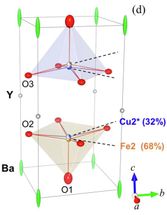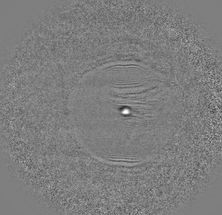Milestone for the analysis of human proteomes
Synthetic peptides and spectra for proteomics
Researchers led by the Technical University of Munich (TUM) report on the synthesis of a library of more than 330,000 reference peptides representing essentially all canonical proteins of the human proteome. It is a major milestone in the ProteomeTools project which aims at translating human proteome information into new molecular and digital tools with the potential for use in drug discovery, personalized medicine and life science research.
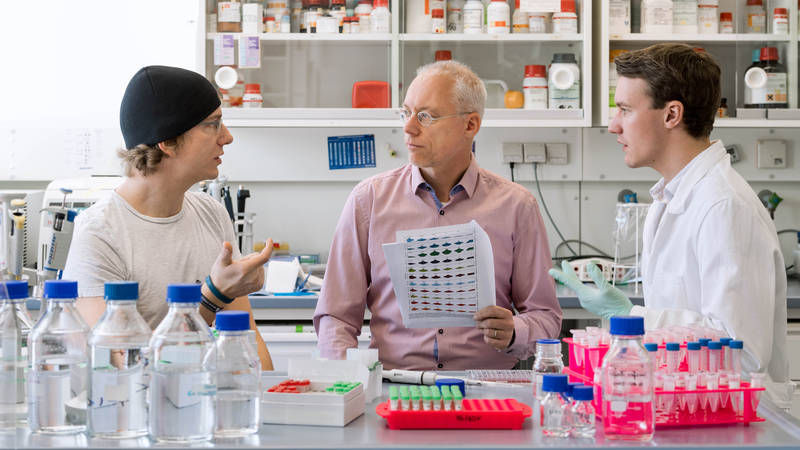
Mathias Wilhelm, Professor Bernhard Küster and Daniel Paul Zolg (f.l.t.r.) in discussion about the ProteomeTools Peptide Library called PROPEL.
Andreas Heddergott / TUM
In a manuscript published online in Nature Methods, ProteomeTools scientists report on the synthesis of a library of more than 330,000 reference peptides (termed PROPEL for ProteomeTools Peptide Library) representing essentially all canonical proteins of the human proteome. All peptides were analysed by multi-modal liquid chromatography-tandem mass spectrometry (LC-MS/MS), creating a compendium of millions of very high quality reference spectra (termed PROSPECT for ProteomeTools Spectrum Compendium). The study illustrates the utility of these reagents and data to verify protein identifications from sparse observations and to predict the behaviour of peptides during liquid chromatography and tandem mass spectrometry.
Data is freely available to the global scientific community
The consortium of TUM, JPT Peptide Technologies (JPT), SAP and Thermo Fisher Scientific has made the vast quantity of data freely available to the scientific community via the data analytics platform ProteomicsDB and the data repository PRIDE to enable scientists and to foster collaboration around the globe.
Going forward, the ProteomeTools project will generate a further one million peptides and corresponding spectra with a focus on splice variants, cancer mutations and post-translational modifications such as phosphorylation, acetylation and ubiquitinylation.
Using the new resources, ProteomeTools scientists will study human proteomes with the aim of turning the vast amount of molecular information on the human proteome into new reagents, equipment, workflows, assays and software to enhance the application of proteomics in both science and medicine.
“ProteomeTools was started as a collaborative effort bringing together academic and industrial partners to make important contributions to the field of proteomics. It is gratifying to see that this work is now producing a wealth of significant results”, says Professor Bernhard Kuster, Chair of Proteomics and Bioanalytics at TUM, and coordinator of the project.
Develop new and improve upon existing hardware, software and workflows
“Representing the human proteome by tandem mass spectra of synthetic peptides alleviates some of the current issues with protein identification and quantification. The libraries of peptides and spectra now allow us to develop new and improve upon existing hardware, software, workflows and reagents for proteomics. Making all the data available to the public provides a wonderful opportunity to exploit this resource beyond what a single laboratory can do. We are now reaching out to the community to suggest interesting sets of peptides to make and measure as well as to create LC-MS/MS data on platforms not available to the ProteomeTools consortium.”
Original publication
Other news from the department science
These products might interest you
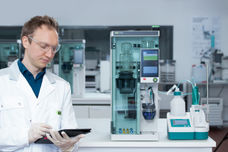
Kjel- / Dist Line by Büchi
Kjel- and Dist Line - steam distillation and Kjeldahl applications
Maximum accuracy and performance for your steam distillation and Kjeldahl applications
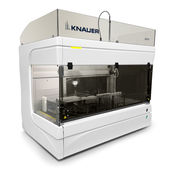
AZURA Purifier + LH 2.1 by KNAUER
Preparative Liquid Chromatography - New platform for more throughput
Save time and improve reproducibility during purification

Get the analytics and lab tech industry in your inbox
By submitting this form you agree that LUMITOS AG will send you the newsletter(s) selected above by email. Your data will not be passed on to third parties. Your data will be stored and processed in accordance with our data protection regulations. LUMITOS may contact you by email for the purpose of advertising or market and opinion surveys. You can revoke your consent at any time without giving reasons to LUMITOS AG, Ernst-Augustin-Str. 2, 12489 Berlin, Germany or by e-mail at revoke@lumitos.com with effect for the future. In addition, each email contains a link to unsubscribe from the corresponding newsletter.
Most read news
More news from our other portals
See the theme worlds for related content
Topic World Spectroscopy
Investigation with spectroscopy gives us unique insights into the composition and structure of materials. From UV-Vis spectroscopy to infrared and Raman spectroscopy to fluorescence and atomic absorption spectroscopy, spectroscopy offers us a wide range of analytical techniques to precisely characterize substances. Immerse yourself in the fascinating world of spectroscopy!

Topic World Spectroscopy
Investigation with spectroscopy gives us unique insights into the composition and structure of materials. From UV-Vis spectroscopy to infrared and Raman spectroscopy to fluorescence and atomic absorption spectroscopy, spectroscopy offers us a wide range of analytical techniques to precisely characterize substances. Immerse yourself in the fascinating world of spectroscopy!
Topic World Chromatography
Chromatography enables us to separate, identify and thus understand complex substances. Whether in the food industry, pharmaceutical research or environmental analysis - chromatography opens up a treasure trove of information about the composition and quality of our samples. Discover the fascinating world of chromatography!

Topic World Chromatography
Chromatography enables us to separate, identify and thus understand complex substances. Whether in the food industry, pharmaceutical research or environmental analysis - chromatography opens up a treasure trove of information about the composition and quality of our samples. Discover the fascinating world of chromatography!












